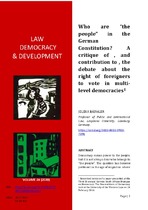| dc.contributor.author | Baumler, Jelena | |
| dc.date.accessioned | 2022-02-14T08:40:41Z | |
| dc.date.available | 2022-02-14T08:40:41Z | |
| dc.date.issued | 2021 | |
| dc.identifier.citation | Baumler, J. (2020). Who are “the people” in the German Constitution? A critique of , and contribution to , the debate about the right of foreigners to vote in multilevel democracies. Law democr. Dev. 24(1). p1-26. http://dx.doi.org/10.17159/2077-4907/2020/ldd.v24.1 | en_US |
| dc.identifier.uri | http://dx.doi.org/10.17159/2077-4907/2020/ldd.v24.1 | |
| dc.identifier.uri | http://hdl.handle.net/10566/7241 | |
| dc.description.abstract | Democracy means power to the people, but it is not always clear who belongs to "the people". The question has become pertinent in the age of migration where large groups of foreigners permanently reside outside their countries of nationality. The economic, cultural, and political integration of these foreigners is one of the pressing problems faced by democratic States in both the developed and developing worlds. One question is : whether resident non-citizens should be granted the right to vote. The answer to this question depends on who belongs to "the people". In federal and quasi-federal States with multiple levels of government the further question arises : whether "the people" is a homogenous concept that applies uniformly across all levels of government. This article contributes to the debate about the right of foreigners to vote in democratic States with multiple levels of government, such as, South Africa and Kenya. It does so by discussing the German response to the problems mentioned above. The dominant view of the German Federal Constitutional Court since the 1990s has been that "the people" only includes "German citizens" , and that attempts by lower levels of government to extend the right to vote to foreigners from Africa and elsewhere are unconstitutional. In this article I explore and critique this conventional view. I then present a positive case for the extension of voting rights to resident non-citizens under the German Constitution. Many of the arguments would apply with equal force to the debate about the right to vote of foreigners in African multi-level democracies, such as, South Africa and Kenya. | en_US |
| dc.language.iso | en | en_US |
| dc.subject | Denizenship | en_US |
| dc.subject | Citizenship | en_US |
| dc.subject | Voting rights | en_US |
| dc.subject | Nationality law | en_US |
| dc.subject | Multi-level government | en_US |
| dc.title | Who are “the people” in the German constitution? A critique of, and contribution to, the debate about the right of foreigners to vote in multilevel democracies | en_US |
| dc.type | Article | en_US |

